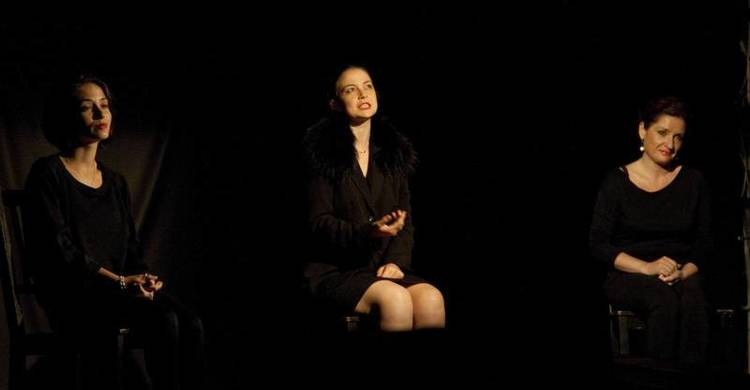


After a successful run at the celebrated Piccolo Teatro [2]in Milano and a tour throughout northern and southern Italy, the show Taddrarite, brought by Accura Teatro, has had its North American debut (during the In Scena! Italian Theater Festival [3]).
Winner of the Roma Fringe Festival 2014 [4], one of the largest multi-arts festivals, the play,
written and directed by Luana Rondinelli [5], is the story of three women, victims of violence, told with irony, intelligence, theatrical skill and superb acting.
As per Sicilian tradition, three sisters vigil beside the body of the husband of the youngest one. All due silence, respect and decency are torn by a whirlwind of confessions. It's like an explosion of emotions: the women can't stop talking, can't keep lying and are dragged into a surreal atmosphere. Franca, Rosa and Maria find the courage to face, with sarcasm, the violence they have been victims of and they have never dared to confess. Starring Anna Clara Giampino, Claudia Gusmano and Luana Rondinelli herself, the play is a grotesque and hilarious presentation of the dramatic life experiences of these women who make us smile but also think.
As per tradition, after a night of vigil, the dead man's soul has left the house and life goes back to normal. The three sisters go back to their life but with a new and renewed sense of identity, with a drive to fight back and stop being victims. Luana Rondinelli had the time to answer a few questions that help us understand more.
How was Taddrarite conceived and what does the title mean?
From an idea, a need, an intuition... a memory... that's how the text was born. A memory from my childhood that has grown into an idea, an idea drivenby a writing need and embellished with some insight. One of the very first lucky “intuitions” was the title, since the beginning I was certain of my choice. Taddrarite is a Sicilian word that means bats (the pronunciation varies from Sicilian region to region). It was a word that I often heard my mother say to my sister; she used to say “mi pari una Taddrarita” (you look like a bat) when she was scolding her because she could not stop moving. It's a word that I use in its feminine and plural form, because I speak of female creatures who are able to survive in the dark, just like the three sisters of the play. An idea of directing the show that I developed as I was writing it; I saw it develop right before my eyes, word by word, image by image...
The stage used against violence on women, how useful is theater in denouncing something?
Theater can, and must, still fulfill the function of revealing something and offering a solution. When I wrote Taddrarite I never would have thought that my words were going to touch the hearts of so many people who are aware of the importance of the issue or who, unfortunately, have been subjected to or know someone who has suffered because of domestic violence. Actually, unlike with many other dramaturgical texts which are immediately given more depth by careful research, interviews, studies and so forth, I did it all at the end. When I was done, I had an explosive revelation: I realized that what I wrote perfectly mirrored reality, I realized that Franca, Rosa and Maria really exist, they live in the North, in the South and in Central Italy. I realized that those words have a message. Our responsibility of denouncing the issue of violence grows with us day by day, every time we are on stage and say those lines. We want people to know that starting over is possible and that we should never keep silent. The message comes clear, from the stage to the viewer, it's there for the audience to grab and take along with them.
Taddrarite uses irony to shed light on a serious matter, what's behind this choice?
The choice was not intentional but instinctive. Something that came up as I was writing and it was the perfect choice, perhaps it was the key to success of this show. I could not talk about such a dramatic theme without trying to lighten or mitigate it; irony has always helped me in life, I had to use it. Talking about violence but with a smile has allowed the audience to be more involved and to open their hearts to the deeper meaning of the text.
How much room is there for Sicilian Women Theater?
There is plenty of room but opportunities have to be created. There is considerable excitement since the days that Emma Dante (a Sicilian writer and actress) was accepted by the general public. Today there is a less utopian possibility to find an opening, but we need a certain drive and that higher gear that all women have and must use. We have the right to be here!
How was the show welcomed in NYC?
In Italy our show is always embraced, here in NYC we were a little apprehensive. But we let ourselves be and the audience really welcomed us. We are shocked. Despite the Sicilian dialect, all language and cultural barriers, emotions have no limitations and at the end of each performance there was not a dry eye, either theirs or ours.
Source URL: http://ftp.iitaly.org/magazine/focus/art-culture/article/taddrarite-theater-tool-public-condemnation-smile
Links
[1] http://ftp.iitaly.org/files/taddrariteluanarondinelliaccurateatro1434409034jpg
[2] https://en.wikipedia.org/wiki/Piccolo_Teatro_(Milan)
[3] http://www.inscenany.com
[4] http://romafringefestival.net
[5] http://www.luanarondinelli.com/luana/